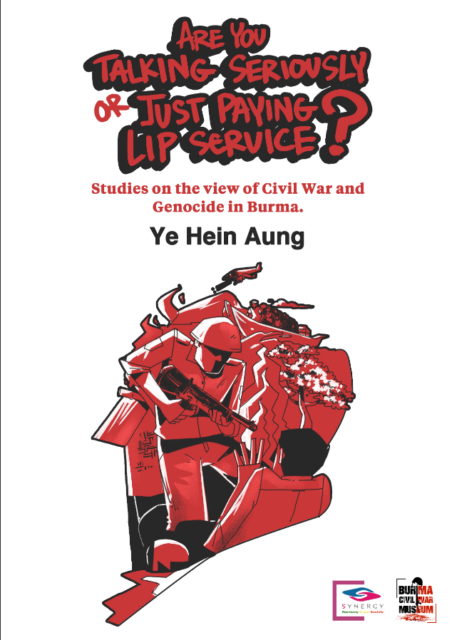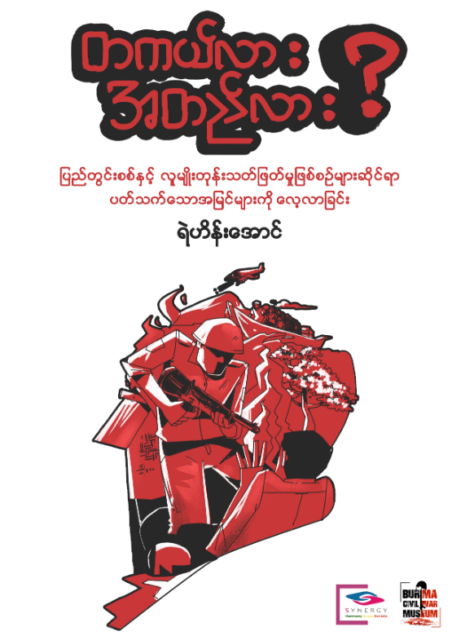Are you talking seriously or just paying lip service? – Studies on the view of Civil War and Genocide in Burma
03 August 2023



Introducing
Burma which is a result of colonization of the British is a region composed of hill, flat lands and deltas in terms of landscape and geography. It emerged as the Union of Burma after gaining independence from the British on 4th January 1948. In Burma, which is known as the Union of Myanmar, many ethnic groups and societies which are diverse in language, culture, tradition, politics, historical context and religion exist.
In Burma, even before independence, because of differences in ideas and beliefs in building the nation and the needs for equality, self-determination and federal issues of ethnic groups, the civil war has started. Up to 2022 since gaining independence, the civil war in Burma has not stopped for 74 years. As a central government, within the 22 years of civilian government administration and 52 years of military administration, the civil war could not be resolved with correct political means. As the union government (or) central government, the civilian governments and military governments have consecutively determined armed revolutionary groups as insurgents. Within the period of 70 years, although peace talks were held repeatedly, it was not successful.
Burma is a country with diverse ethnic groups and societies. But, the successive governments have failed to carry out good awareness, value actions and build mutual understandings and trust regarding diversity in political systems, administrative patterns, education, literature and cultural issues. Instead, it was built on Myanmar language, Myanmar culture and Buddhist faith as the main pillar of the country and based on chauvinism. Ignoring diverse ethnic groups and societies, focusing on political build-up based only on a single race rather than a plural society, failure to build an authentic federal union by successive governments have existed as basic problems of Burma and these factors play a crucial role in the fundamental issues of civil war.
Along with the failure to build the nation based on diversity, racial and religious conflicts have occurred many times in Burma. Starting from 1988 until now, racial and religious conflicts have occurred nearly 100 times and most incidents are targeted on Muslims. Starting from the time Gen Ne Win took power in 1962; hostile attitudes towards Muslims have spread in government officials and society. Since then, the opposition against Muslims by hate speech and misinformation have spread among government publications, surmons of Buddhist monks and religious leaders and even to classrooms. Regarding those situations, successive governments have failed to take action and stop it.
The height of the hostilities reached the highest in 2012 and 2021 and spread on media and social media. Multi-sector oppression such as not to engage or trade with Muslims, limiting to involve politically by enacting official laws and other unofficial means were carried out. Within these activities, it was found that not only people in administration, judiciary and legislation as government but people in the entertainment sector who are intellectuals, writers, media, actors and singers were also involved.
During the civil war and racial and religious conflicts, the Myanmar army mainly committed horrible crimes against ethnic groups and societies. During the assault against the armed revolutionary groups, targeting unarmed civilians, burning houses and destroying the lives and livelihoods of the people were destroyed intentionally. Moreover, it was found that women were targeted and rape is used as a weapons in non Burmese ethnic regions. These atrocities were accused as war crimes and crimes against humanity. Additionally, incident of genocide which is a severe crime in society has happened in Burma. It was committed on the Rohingya groups in Rakhine State.
Rohingya people are the people who have settled in Arakan region4 for hundreds of years. Arakan Region was invaded by King Bodawpaya who was a king from the Konbaung dynasty of Myanmar people in 17845. Since then, Arakan Region has fallen under Burma and the fate of ethnic groups in Arakan Region is also under the decision of successive governments including the military dictators of Myanmar.
Rohingya people started to suffer from significant violations of human rights since the Revolutionary Council led by Gen Ne Win staged the coup. Political restrictions including citizenship were faced by Rohingya people. Even the name “Rohingya” which is the basis of existence of Rohingya people is restricted and successive governments have intentionally pictured them as “Bengali” people who are illegally migrated from the neighboring country. A horrible incident happened in 1978. During the rule of government of Burma Socialist Programme Party (BSPP), Rohingyas were driven out from Myanmar with Operation King Dragon and within the same year, Rohingya people were repatriated with Hintharr project. Then, in 1982, BSPP government has enacted a new citizenship law. In that law, the views of racial and religious discrimination and the views of citizenship based on blood lines are included.
Driving the Rohingyas out was carried out for the second time in 1991. State Law and Order Restoration Council led by Sr Gen Saw Maung who crushed the 1988 uprising and took power drove hundreds of thousands of Rohongya people out with Operation Pyitharyar for the second time. During that incident, Rohingya people faced various methods of abuse including killing and raping by the Myanmar army. Regarding the fleeing of hundreds of thousands of Rohingya people from Rakhine State, the state newspapers have mentioned it as voluntary departure by the Rohingya people. Later, bilateral agreements were signed between the SLORC government and Bangladesh government and the Rohingya people were repatriated. Although they are repatriated, human rights violations and discrimination were carried out on Rohingya people by the successive Myanmar governments. Discrimination are conducted by enacting local laws which are targeted against the Rohingya people regarding basic human rights including denial of citizenship especially.
Since the intentional discrimination and human rights violations on the Rohingya people are committed with the intention to wipe out Rohingya people from Burma by the Myanmar governments, the international community accused this incident as genocide against Rohingya people. The level of atrocities committed against Rohingya people reached the highest after the conflicts that happened in Rakhine State in 2012. Anti-Rohingya and Muslim activities become stronger. In these activities, not only the ultranationalists but the celebrities also took part in it. It was found that The Union Solidarity and Development Party led by president U Thein Sein which was the government at the time not only did not contain the situations but also encouraged it directly (or) indirectly.
In August 2017, Rohingya people faced the worst situation. With the accusation of attacks by an organization called ARSA (Arakan Rohingya Salvation Army) on (30) police outposts, Myanmar army waged a clearance operation. In that operation, Myanmar army committed severe human rights violations such as burning many villages where Rohingya people lived, killing and raping Rohingya people. Nearly 1 million Rohingya people took refuge in neighboring Bangladesh. It was found that the government of National League for Democracy Party stood together with the Myanmar army regarding these atrocities.
Regarding these plans to commit genocide intentionally against Rohingya people, Myanmar government is still facing trial at international courts. In 2019, Myanmar was pressed charges with violation of Convention on the Prevention and Punishment of the Crime of Genocide by International Court of Justice. In that lawsuit, the government of National League for Democracy Party stood together with Myanmar army and State Counsellor Daw Aung San Suu Kyi herself faced the trial.
Burma which was sinking among the civil war, religious and racial conflict, genocide and coups for (70) years because of the situations mentioned above, faced a worse political event again on February 1st 2021. With the leadership of Sr Gen Min Aung Hlaing who is accused as the most responsible person for human rights violations including genocide, the Myanmar army attempted to stage a coup. Peaceful protests led by the leadership of people occurred against the coup attempt. But, the Myanmar army responded with violent means including severe crackdown, killing and arresting on the protests of the people. Therefore, the people are waging an armed resistance to defend against the coup attempt by the Myanmar army and their peaceful existence.
Announcements
21 May 2025
Open letter: Malaysia must lead ASEAN with principle, not hypocrisy, to address the Myanmar crisis

Progressive Voice is a participatory rights-based policy research and advocacy organization rooted in civil society, that maintains strong networks and relationships with grassroots organizations and community-based organizations throughout Myanmar. It acts as a bridge to the international community and international policymakers by amplifying voices from the ground, and advocating for a rights-based policy narrative.